Specific expert advice to local, regional or national government
Universities often play a crucial role in providing expert advice to various levels of government, whether it’s local, regional, or national. This role is commonly referred to as “academic or research expertise” or “academic engagement in public policy.” In many countries, government agencies and universities have established partnerships and channels of communication to facilitate the exchange of knowledge and expertise. This collaboration between academia and government can lead to more informed, evidence-based policies and better decision-making at all levels of government.
Expert Advice to National Government
Expert’s Recommendations and Strategies for Kalinga Ghat Road Widening Project to National Highways, Sambalpur Division
The Kalinga Ghat road widening project, aimed at eliminating a black spot on NH-157, involves innovative slope stabilization techniques. Based on expert advice from KIIT, the following recommendations and strategies have been proposed for the successful implementation of this project:
- Detailed Geotechnical Assessment: Prior to construction, comprehensive geotechnical surveys should be conducted to assess soil characteristics, groundwater conditions, and slope stability. This will help refine the design parameters for reinforcement systems such as the Reinforced Earth Composite/Hybrid and Soil Nail techniques.
- Enhancing Safety with Technology: The use of advanced systems like Reinforced Earth Composite/Hybrid has proven effective in improving slope stability. Continued integration of these systems, especially in high-risk areas, will enhance road safety and reduce the risk of landslides and accidents.
- Improved Drainage Systems: Efficient drainage solutions are essential to prevent water accumulation, which can destabilize slopes. The inclusion of cross-drainage structures, along with soil nail techniques, should be prioritized to address water-related issues and mitigate slope erosion.
- Continuous Monitoring and Maintenance: Establish a robust monitoring system using remote sensing technologies to track the road’s structural health. This will allow for early detection of any slope movement, enabling timely interventions to prevent road blockages or accidents.
These strategies will ensure the long-term stability of the road and contribute to enhanced safety for commuters along the Kalinga Ghat stretch.
https://civil.kiit.ac.in/research/consultancy/
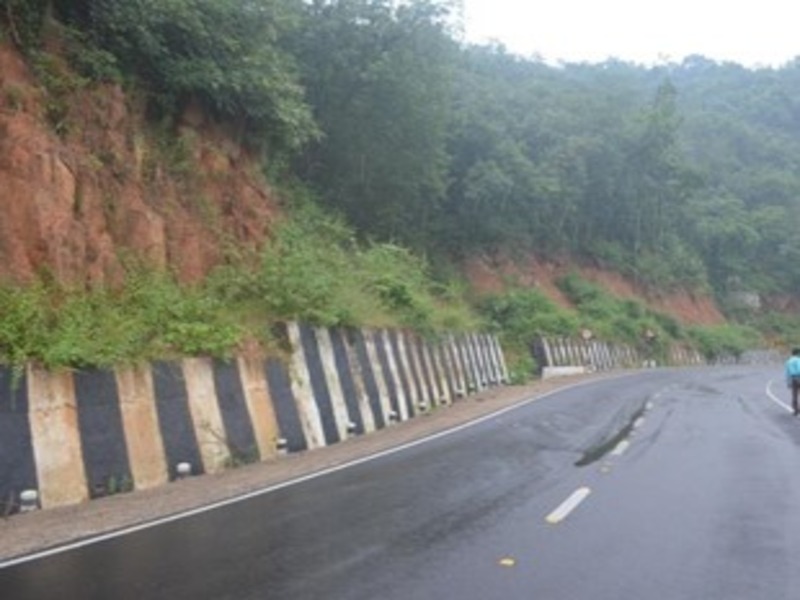 |  |
 |
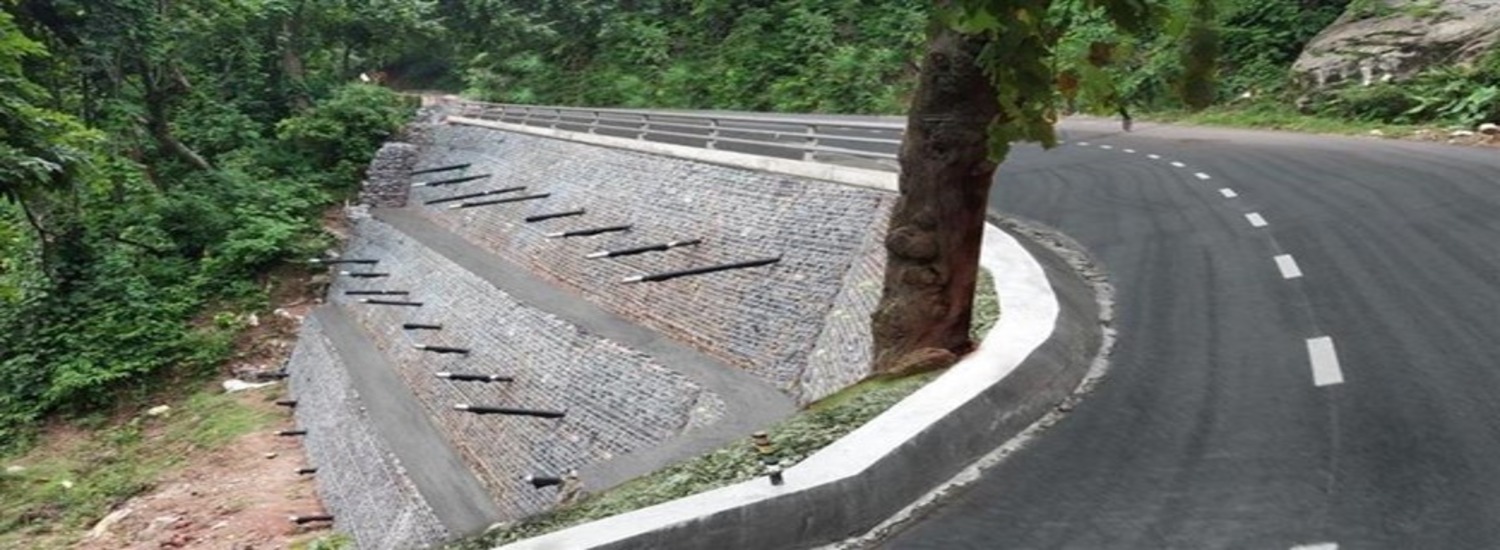 |
Expert’s recommendations and Strategies for Daringibadi Ghat Protection Work to National Highways, Berhampur Division
- Enhanced Geotechnical Investigations: A more detailed geotechnical investigation should be conducted to assess the soil characteristics, groundwater conditions, and structural integrity of the slope, ensuring that the protection measures are tailored to the specific challenges of the site.
- Strengthening the Reinforced Earth Composite System: While the Reinforced Earth Composite/Hybrid system has shown effectiveness, it is advisable to periodically monitor and strengthen the system to ensure its resilience, particularly after heavy rainfall or future cyclonic events.
- Improved Drainage Management: The installation of robust drainage systems is essential to prevent water accumulation behind the reinforced structures. This will reduce soil erosion, prevent further damage, and maintain slope stability.
- Continuous Monitoring and Maintenance: Ongoing monitoring of the soil nails and hybrid systems should be implemented to detect early signs of failure or shifting. Additionally, periodic maintenance, especially after heavy rains, will be crucial to maintaining the road’s safety and stability.
 |
 |
 |
Expert’s Advice for Protection Measures at Kalinga Ghat on NH-157 to National Highways, Sambalpur Division
The project on NH-157, spanning Kalinga Ghat from chainage 83/00 to 93/00 in Sambalpur Division, Odisha, addressed severe slope instability caused by road widening and environmental factors. Sanctioned under the Ministry of Road Transport & Highways for ₹1497.94 Lakhs, the initiative implemented soil nailing across 295 meters of critical stretches to prevent frequent landslides and ensure road safety.
The slope’s natural stability was compromised by unsupported heights, loose soil profiles with heavy boulders, water seepage, and vegetation loss. These factors contributed to recurring accidents, traffic disruptions, and property damage. Soil nailing, a proven technique in geotechnical engineering, was adopted based on expert recommendations. This method anchors steel bars into the slope to reinforce and stabilize the soil, mitigating lateral movement and enhancing the hill’s structural integrity.
Recommendations: The National Highways, Sambalpur Division, should adopt proactive measures such as regular geotechnical monitoring, maintenance of drainage systems to control water seepage, and afforestation to restore vegetation and enhance long-term stability.
Strategies: Incorporating expert advice, future projects should include advanced slope analysis, real-time monitoring systems, and integration of eco-friendly stabilization techniques to ensure sustainability and resilience against adverse weather conditions. Such measures are vital for safeguarding lives, property, and seamless road connectivity.
https://civil.kiit.ac.in/research/consultancy/
 |  |
Expert Advice to the National Monuments Authority (NMA)
The National Monuments Authority (NMA), under the Ministry of Culture, Government of India, oversees the protection and management of India’s ancient monuments as per the Ancient Monuments and Archaeological Sites and Remains (Amendment and Validation) Act, 2010. Recognized as a Heritage Body since 2022, KIIT School of Architecture & Planning has provided expert consultancy services to the NMA.
In 2023, the school undertook a significant project titled “Heritage Consultation of Heritage Bye-Laws of Centrally Protected Monuments & Protected Areas” for nine heritage sites across Odisha. Led by Prof. S. S. Ray, Director General, KIIT School of Architecture & Planning, the project involved site-level surveys, critical assessments, and expert recommendations for the effective development of heritage guidelines. This consultation underscores the pivotal role of academic institutions in shaping national heritage policies and promoting sustainable preservation strategies.
Key Recommendations
- Heritage Value Integration: Incorporate cultural, historical, and architectural significance into Bye-Laws to ensure holistic heritage preservation.
- Local Body Collaboration: Align guidelines with local development regulations and building parameters for better inclusivity and feasibility.
- Site-Specific Inputs: Tailor recommendations to the unique requirements of each heritage site for precise and actionable Bye-Laws.
Outcomes
- The project resulted in a comprehensive consultation report addressing technical evaluations, heritage controls, and specific recommendations for the nine sites.
- The appraised Heritage Bye-Laws emphasized a balanced approach between preservation and modern development, ensuring sustainability and inclusivity.
- The revised Bye-Laws are now in the public consultation phase and will soon be officially released for implementation, contributing to the effective management and preservation of India’s heritage.
Expert’s Recommendations and Strategies for National Council for Cement and Building Materials (NCCBM)
The partnership between the School of Civil Engineering and the National Council for Cement and Building Materials (NCCBM) represents a pioneering collaboration to advance infrastructure development through sustainable practices. This consortium leverages the combined technical expertise, resources, and management capabilities of both institutions. Based on expert advice from KIIT, the following recommendations and strategies are proposed to enhance the effectiveness of this collaboration:
- Enhanced Technical Consultancy: To maximize the impact of this partnership, the consortium should focus on providing cutting-edge technical consultancy in areas like sustainable materials, construction technologies, and eco-friendly practices. This will cater to the growing demand for green and efficient infrastructure solutions.
- Research and Development (R&D): Continuous investment in R&D is crucial for developing innovative building materials and construction methodologies. Joint research initiatives can explore alternative materials, reduce carbon footprints, and promote the use of locally sourced materials for infrastructure projects.
- Capacity Building and Training: The consortium should prioritize training programs to enhance the skill set of engineers and technicians, ensuring the adoption of modern technologies and practices in construction.
- Sustainability in Projects: Ensuring sustainability should be a cornerstone of all projects undertaken. The consortium must integrate environmental impact assessments into the planning stages of projects, promoting green construction methods that minimize waste and energy consumption.
By following these strategies, the consortium can set new benchmarks for infrastructure development, while contributing significantly to the sustainable growth of Odisha and beyond.
 |  |  |
Expert Advice on Media Trial and Justice Administration: A Critical Perspective
Dr. Tulishree Pradhan, Associate Professor, School of Law, KIIT Deemed to be University has provided valuable insights into the interplay between media trials and the administration of justice. Her critical study underscores the urgent need to strike a balance between the right to free speech and the right to a fair trial in India. The research highlights the media’s growing influence in shaping public opinion and its potential to compromise judicial impartiality, forming the justice system’s cornerstone.
With the support of the Indian Council of Social Science Research (ICSSR), the study titled “The Impact of Media Trial on Administration of Justice – A Critical Study” has delivered logical findings that informed national policy-making, including insights that align with provisions incorporated into the Digital Data Protection Act, 2023.
Key Recommendations and Outcomes
1. Balancing Media Freedom with Natural Justice
Advocated responsible journalism and robust guidelines to prevent media sensationalism, ensuring judicial impartiality and safeguarding the principles of natural justice.
2. Strengthening Legal and Policy Frameworks
Recommended privacy safeguards and media regulations influencing key legislation, such as the Digital Data Protection Act, 2023 to protect individual rights and maintain ethical data dissemination.
3. Judiciary’s Role in Preserving Constitutional Rights
Emphasized judicial oversight to uphold Article 19(1)(a), balancing free expression with judicial equity and fostering accountability to protect democracy and individual rights.
This work has sparked critical conversations on the delicate balance between media freedom and the right to a fair trial. By advocating for ethical journalism and public awareness, her recommendations aim to create a just society where the media acts as a democratic pillar without undermining judicial integrity. The integration of these insights into national policies marks a significant step toward achieving justice, fairness, and accountability in India’s media landscape.
Strategic Points:
· Media must prioritize responsible and ethical journalism.
· Sensationalized reporting in active trials must be regulated.
· Public literacy initiatives on media ethics should be launched.
· Free speech must align with judicial fairness to ensure societal balance.
· Policies and legislation like the Digital Data Protection Act, 2023, must evolve with these principles in mind.
KIIT's Expert Guidance on Advanced Research Methodology and Data Analysis: Strengthening Higher Education Research Capacities
In alignment with the government’s commitment to enhancing research capacity in higher education, KIIT Deemed to be University has submitted expert advice to the Association of Indian Universities (AIU) regarding the inclusion of advanced research methodologies and data analysis in the ongoing development programs for academic professionals. The focus of this expert advice is to provide a comprehensive framework for empowering participants with both the latest tools and foundational insights into the critical areas of research methodology and data analysis.
The program aims to equip scholars, academicians, and researchers with in-depth knowledge of advanced research techniques, both quantitative and qualitative, which are essential in today’s rapidly evolving academic landscape. By providing hands-on experience in tools like AMOS, SPSS, and other qualitative data analysis software, the program fosters a deeper understanding of data management and analysis.
The advice emphasizes the importance of equipping researchers with knowledge on structural equation modeling (SEM), confirmatory factor analysis (CFA), and path model analysis (PMA), along with methods to navigate multivariate data analysis. Moreover, the program’s focus on ethical research practices, systematic literature reviews, and strategies for publishing in high-impact journals is designed to ensure the highest standards in academic output and integrity.
By facilitating such advanced training, this program contributes significantly to the development of robust research capacity within the academic community and supports the government’s vision of promoting research excellence in India’s higher education sector.
Key Recommendations and Outcomes:
- Comprehensive Training in Research Methodology:
- The program offers advanced training in both quantitative and qualitative research methodologies, equipping participants with essential skills for high-quality academic work.
- In-depth Data Analysis Techniques:
- Participants gain expertise in advanced data analysis tools such as Structural Equation Modeling (SEM), Confirmatory Factor Analysis (CFA), and multivariate analysis using SPSS, strengthening their research capabilities.
- Focus on Qualitative Research:
- The program emphasizes qualitative research methods, providing insights into qualitative data analysis software and ethical research standards to ensure academic integrity.
- Publication in High-Impact Journals:
- Guidance is provided on publishing research in high-impact journals, ensuring participants meet the highest academic standards for scholarly dissemination.
- Personalized Mentorship and Practical Experience:
- Experts will offer hands-on training and personalized mentorship, supporting participants throughout the program and enhancing their research proficiency.
This initiative by AIU, with expert advice from KIIT, supports the goal of strengthening India’s research capabilities, ultimately contributing to the global academic community.
KIIT's Expert Advice to Government on Post-Pandemic Public Health Research Collaborations
The KIIT School of Public Health (KSPH) hosted a National Seminar titled ‘Collaborations in Public Health Research: The Post Pandemic Priorities’, aimed at discussing the evolving landscape of public health research and the importance of collaborative efforts in the post-pandemic era.
The discussions during the National Seminar on ‘Collaborations in Public Health Research: The Post Pandemic Priorities’ highlighted several critical areas that require immediate attention to enhance public health preparedness and response. A key recommendation is the need for greater community awareness to promote proactive health measures, especially in the context of pandemic prevention and control. Public health education must be prioritized to ensure better public engagement and understanding of health risks.
Additionally, the seminar emphasized the importance of global and local collaborations in public health research and response. It is crucial for the government to foster stronger partnerships with international public health bodies and expand the activities of the Asia Pacific Academic Consortium for Public Health (APACPH) within India. Such collaborations would significantly enhance knowledge sharing, capacity building, and preparedness for future health crises.
Further, the need for strengthening health systems and surveillance mechanisms was also discussed. The government is urged to invest in robust health infrastructure, improve disease surveillance systems, and ensure timely data sharing across health departments to effectively manage and mitigate public health threats. These actions will not only strengthen India’s pandemic response capabilities but also bolster long-term health system resilience and sustainability.
Recommendations to the Government:
- Promote Global Collaboration in Public Health Research:
- Strengthen international partnerships and collaborations to enhance pandemic preparedness and response, drawing from the successful models of countries like South Korea.
- Invest in AI and Digital Health for Public Health Advancements:
- Encourage research and development in AI, digital health technologies, and telemedicine to improve pandemic monitoring, healthcare delivery, and long-term health system resilience.
- Regulate and Expand Telemedicine:
- Create comprehensive policies and frameworks to regulate and promote telemedicine in post-pandemic healthcare systems, ensuring equitable access and quality of care.
- Focus on Community Engagement and Awareness:
- Increase efforts in educating the public about pandemic prevention, healthcare practices, and emerging health technologies to foster better community health outcomes.
- Strengthen Ethical Guidelines in Healthcare Research:
- Develop clear ethical standards for healthcare research, ensuring that public health initiatives respect privacy, consent, and equity, especially in digital health and AI-based research.
Outcomes:
- Enhanced Global Collaborations:
- Strengthened ties with international public health organizations, enhancing India’s role in global pandemic preparedness and response networks.
- Improved Pandemic Response Framework:
- A better understanding of the role of AI, digital health, and telemedicine in future pandemic responses, leading to more effective policy-making in these areas.
- Policy Development for Telemedicine:
- Recommendations for a robust telemedicine regulatory framework, ensuring that digital health solutions are widely accessible, effective, and integrated into the national healthcare system.
- Boosted Public Health Awareness:
- Increased emphasis on public health education, leveraging digital platforms to disseminate critical health messages and improve community health engagement.
- Ethical Health Research Standards:
- Adoption of stronger ethical guidelines in public health and healthcare research, ensuring that new technologies and methodologies are implemented responsibly and transparently.
Expert Advice through “Paramarsh” Scheme
The ‘Paramarsh’ scheme of University Grants Commission (UGC), India is meant for mentoring National Assessment and Accreditation Council (NAAC) accreditation aspirant institutions to promote quality assurance in higher education in India. The University has been nominated as a mentor institute to extend all sorts of support to the mentee institutions awaiting for accreditation in different stages starting from preparation of Self Study Report to visit of Peer Team Members by NAAC. The whole process is coordinated by University Internal Quality Assurance Cell (IQAC). In this scheme, 32 colleges and 4 Universities have signed their MoU with the University. The Activities in paramarsh scheme is oriented for SDG 4: access to and providing quality education.
The detailed methodology, progress report, list of participating institutions are provided by following links.
https://filedata.kiit.ac.in/reports/Paramarsha-Report.pdf
https://filedata.kiit.ac.in/reports/Status-Report-of-Paramarsha.pdf
https://news.kiit.ac.in/kiitnews/kiit-launched-paramarsh-scheme-of-ugc/
Expert Advice through KIIT-Technology Business Incubator (KIIT-TBI)
Today KIIT-TBI is recognized as a “Centre of Excellence in Incubation” awarded by DST, Govt of India. As a Technology Business Incubator, it has been networked with all TBIs in the country through various networks like ISBA through which the organization is networked with AABI (Asia Pacific), European UKBI and US NBIA. It is also a member of the Asia Pacific Incubator Network (APIN). Over the years, KIIT-TBI has been working as an implementing partner of variuos government sponsored flagship funding and fellowship programs like DST – NIDHI EIR and PRAYAS, DBT BIRAC – Biotechnology Ignition Grant, Boeing India – BUILD Program, DBT BIRAC–Social Innovation Immersion Programme, Invest India – Agriculture Grand challenge and many more. Recently, KIIT-TBI has been recognized as one of the satellite centers for DST-CAWACH Program and MeitY SASACT Program. The DBT BIRAC has established one of its regional centers (BRTC) at KIIT -TBI to promote the startup ecosystem in east and northeast regions of India abd SPARSH center to address the problems of societal relevance through technological solutions. MSME, Govt. of India has established SFURTI Centre at KIIT-TBI to promote cluster development. KIIT-TBI is also identified as the Nodal Incubator to set up Food Testing Lab facility by Startup Odisha.
Recently DBT BIRAC announced to establish one of the Technology Transfer officers in KIIT-TBI. KIIT-TBI provides an appropriate platform and environment with a world-class infrastructure of around 120,000 sq. ft. that offers a wide range of incubation facilities and services to the prospective entrepreneurs to convert their innovative ideas into commercially viable products and till date, it has already incubated and mentored 200+ startups and filed 80+ IPs. KIIT-TBI is incubating startups in the domain of IT and Engineering, Cleantech, Healthcare and Life Sciences, Biotechnology, Agri and Food Tech and other social innovation areas. KIIT-TBI always holds the door wide open to welcome innovations to grow in to businesses by its stimulating and enterprising ecosystem.
Function of KIIT-TBI
- Build appropriate training programmes suitable for socio – economic culture of odisha.
- Identify market niche for technology products and services to be addressed.
- Train the entrepreneurs in technology and business management.
- Offer the professional business development services for the entrepreneurs who have mature concepts for unique and innovative products assessed to have strong commercial viability.
- Provide platform for IPR protection, technology transfer and commercialization facility for the innovators.
The more details regarding KIIT-TBI and its’ collaboration, activities are provided in the below link
https://kiitincubator.in/overview/
Expert Advice through KIIT Technology Enabling Centre
KIIT Technology Enabling Centre (KIIT-TEC) is established at R&D building, Campus-3, KIIT DU with the support from the Department of Science and Technology (DST), Government of India. It acts as an enabler to built a hub and spokes model among Industries and Academia to solve the existing problems of the industries in and around with efficient use of the research facilities of the academia. Further KIIT-Tec will act as a facilitator to create an ecosystem to boost innovation and commercialize the existing and newly developed technologies in and around. KIIT-TEC creates an Ecosystem for Technology Development primarily in the state of Odisha by networking Industries (MSMEs) with researchers, institutes, universities, National laboratories, and regional laboratories in all possible ways by:
- Allowing several industries to collaborate with KIIT-TEC as members/partner industries
- Allowing several institutes to collaborate with KIIT-TEC as members/partner institutes
- Showcasing tech-briefs of the technologies developed at academia at our platform
- Showcasing industry problem statements that can be addressed by the researchers of academia for commercial collaboration or collaborative research
- Showcasing Academia’s/Industry’s equipment and lab facilities on our platform to allow commercial access to public, other departments/academia and industries
- Allowing faculty members to register as academia experts and showcase their capabilities/ services that can be useful to solve a specific technological problem and act as mentors.
- Providing access to IP mining reports of different tech domain/industry category in the dense technology area (Cluster Analysis)
- Showcasing the IP portfolio of each partner institute/academia that is ready for commercialization.
- Providing access to IP portfolio reports of whole state of Odisha and other geography
- Allowing member industries to showcase their materials, equipments, products and services that are useful to academia and KIIT-TEC members on our platform
- Allowing industry mentors to register as experts on our platform
- Providing access to several funding opportunities for proof of concept, prototype development, product trials, market entry and commercialization
- Providing access to tailored mentorship, IP services, and other activities during technology enabling
- Allowing to book/attend an event or program for your industry/academia on innovation promotion or commercialization
- Connecting industry/academia representatives (TEC ambassadors) for better coordination
- Providing access to quick and free solutions for general industry problems as answered by Academia experts/mentors
- Providing access to ongoing research area in collaboration with KIIT-TEC
- Providing free membership to all including academia/industry/expert/ mentor/ students/ innovators/ researchers
- Providing access to other Indian TEC centers
- Providing access to investors (Shark Bank) for further funding opportunities and/or commercialization
More details about KIIT-TEC is provided in the following link
Expert Advice through Centre of Excellence for Sustainability and Equity
The centre is established to create awareness among students, staff and general public about the needs and importance of sustainable development goals, its importance and impact on the progress of our nation. This Center of Excellence has been working on gathering, measuring and analyzing data related to different sustainable development goals both at national level and international through its collaborations, partners, NGOs, surveys and research activities. It is also working towards more collaborations at national and international level, NGOs and corporate to frame policies and decide on plan of action to meet the goals.
KIIT-TBI provides the expert advice on National Innovation and Startup Policy to the Ministry of Human Resources Development, Government of India to promote and support innovation, technology commercialization and startups in academic setup.
More details is provided in the following link:
Expert Advice to National Highway Authority of India (NHAI):
- 74.5 km stretch from Chandikhol to Bhadrak Section on NH-5 (New NH-16)
- 166 km stretch from Panikoili to Rimuli Section on NH-215 (New NH-20)
- Improvements in safety provision by removing existing deficiencies.
- Improvements in continual maintenance of the stretch using new technologies.
- Localized solutions for removal of congestion points thereby increasing the average speed of traffic flow.
- Improvements in the riding comfort through cost effective measures based on innovative technologies on practices applicable in the area.
- Viability of new way side amenities for road user based on the existing traffic pattern and user expectations.
- Potential solutions to old recurring problems based on local experience etc.
 |
 |
 |
 |
Expert Advice to local and regional Authorities
Faecal sludge and septage management (fssm)
As phase II of the program, the State Government has now embarked to scale FSSM services from nine AMRUT Mission towns to 118 towns spreading across 30 districts under the Govt Flagship ‘Swachh Odisha Sustha Odisha’ Banner on Faecal Sludge and Septage Management (FSSM), for improving sanitation for all as part of the vision of the Hon’ble Chief Minister of Odisha. Technical Support was provided by EY LLP to Housing & Urban Development Department, Government of Odisha. EY led TSU has engaged Kalinga Institute of Industrial Technology (KIIT), Bhubaneshwar in 8 districts of Odisha to build local technical capabilities and execute the interventions during the year 2020-22.
Implementation Methodology: The partnership between EY & KIIT DU focused on two areas:
(1) Urban FSSM Fellowship Program to support at program delivery at district level (Gajapati, Mayurbhanj, Rayagada, Bargarh, Subarnpur & Boudh, Kendrapada, Jagatsinghpur, Kandhamala) and construction of Septage Treatment Plant at 28 ULBs
(2) Technical support through R&D to identify improvement in existing FSSM infrastructure such as efficiency enhancement of existing treatment plant at Basuaghai, Bhubaneswar, Odisha, Inclusion of FSSM in academic curriculum and Training infrastructure to conduct FSSM programs
Indian Patent Filed: 01 on “METAL DOPED FECAL SLUDGE BIOCHAR FOR TREATMENT OF WATER” (Application No. 202231000798 and published on 07/07/2023)
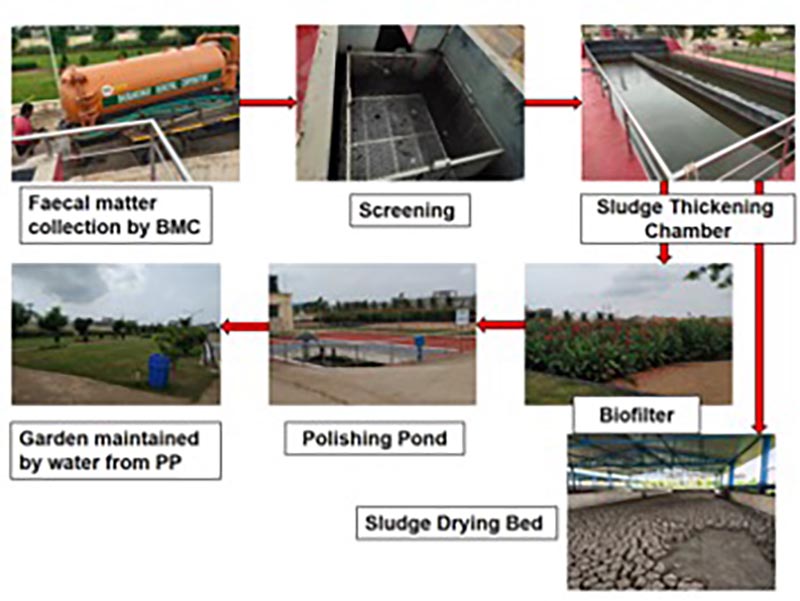 | 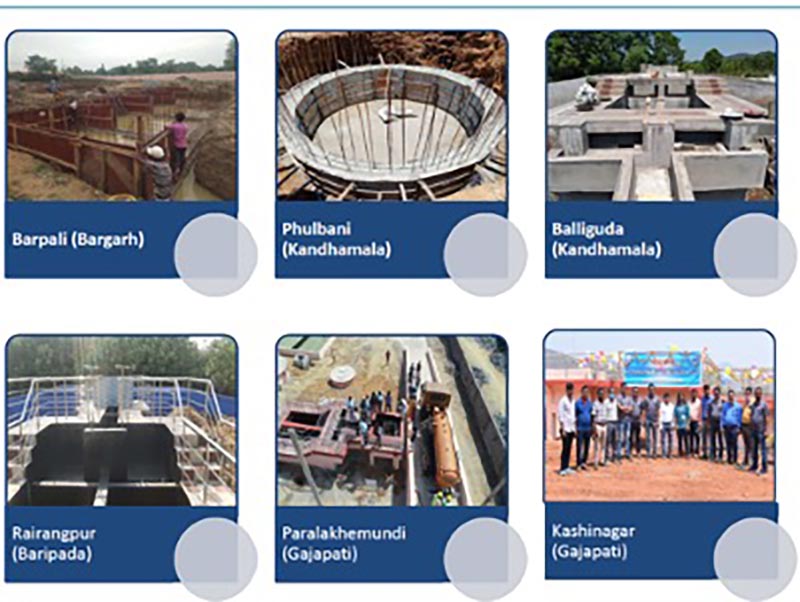 |
https://sustainability.kiit.ac.in/wp-content/uploads/2023/11/NHAI-KIIT-MOU.pdf
Expert Advice to National Government on “Design of weight release and auto release GPS floating locator for LWT torpedo”
KIIT University has developed and delivered the concept designs along with drawings and proof concepts for the modified shell for TAL torpedo on 18-May-2023, against the service order number 3420007711/SO dated 17-October-2022. KIIT University will be providing the warranty of 12 months for all the designs/drawings/3d models against the PO. Since the proof of concepts were delivered physically, service will be provided for maintaining the same.
The assembly procedure was jointly developed by KIIT and BDL SEG team and a demonstration was given to the SEG team.
https://sustainability.kiit.ac.in/wp-content/uploads/2023/11/Evidence_16.3.1-DRDO1.pdf
Expert Advice to National Government on “Design of self recovery mechanism for HWT torpedo”
KIIT-DU has developed and delivered the concept designs along with drawings and proof concepts for the modified shell for HWT torpedo on 18-May-2023, against the service order number 3420007791/SO dated 21-October-2022. KIIT-DU will be providing the warranty of 12 months for all the designs/drawings/3d models against the PO. Since the proof of concepts were delivered physically, service will be provided for maintaining the same.
The assembly procedure was jointly developed by KIIT and BDL SEG team and a demonstration was given to the SEG team.
https://sustainability.kiit.ac.in/wp-content/uploads/2023/11/Evidence_16.3.1-DRDO2.pdf
Expert Advice through “Department of Public Policy” and “Centre Excellence on Public Policy Research”
The University has established a Department named as “Department of Public Policy”. The mission of the Department are
- The Department will be devoted to the study of public policy analysis, design, implementation, and evaluation adopting an evidence-based cross-disciplinary approach.
- Acting as a think-tank, it will independently capture and analyze the public perception of the social and economic impact of the current government policies and share its findings with the concerned policy administrators.
- Collaborating with national and international institutes and scholars, it will undertake public policy projects of national and global importance.
- It will offer graduate programs, equipping the young students with the most relevant and contemporary critical thinking, problem-solving, data analytic, and communication skills to meet public policy challenges in their professional careers.
More details about the Department and its’ activity is given in below link
https://kdpp.kiit.ac.in/about-us/
Further the University established centre of excellence named as “Centre Excellence on Public Policy Research” with a vision to conduct extensive research on social, political & economic policies and design strategies that lead to change in public policy and governance. The details about the centre and its’ activities are given below:
https://kiit.ac.in/policies/centre-for-excellence-on-public-policy-and-research/
Providing Expert Opinion and Advice through Institutional Membership
https://kiit.ac.in/about/global-footprint/
- Academic Partnership of The IET, UK Association of Commonwealth Universities (ACU)
https://www.theiet.org/involved/partnerships/academic-partners/academic-partnership-in-india/
- European Association of International Education
- International Association of Universities (IAU)
https://www.iau-aiu.net/List-of-IAU-Members?lang=en
- International Association of University Presidents (IAUP)
- United Nations Academic Impact (UNAI)
- Asia-Pacific Academic Consortium for Public Health
https://news.kiit.ac.in/kiit-school-of-public-health/kiit-school-of-public-health-becomes-an-active-member-of-global-network-for-academic-public-health/
- Association of University of Asia Pacific (AUAP)
- Eurasian Silk Road Universities Consortium (ESRUC), Turkey
http://esruc.atauni.edu.tr/katilimciListesi.html
- University Mobility in Asia and the Pacific (UMAP)
http://umap.org/about/membership/#india
- School of Public Health, KIIT has also become active member of two of the regional associations – Asia-Pacific Academic Consortium for Public Health (APACPH) and South East Asia Public Health Education Institutions Network (SEAPHEIN) in 2020.
- The University is member of Indian Science Congress Association, Indian Commerce Association, Indian Society for Technical Education, Indian Social Science Congress, Khelo India Organisation and Association of Indian Universities (AIU)
- The University is the advisor of Royal Government of Bhutan on Higher Education. The University imparts special training and skill development programmes to reachers, principals and officials of Government of Bhutan This initiative of the International Relations Department & School of Advanced Skills (KSAS) has been continuing since 2017. The Programme of Short Term Skill Development Training Programme for the participants from Bhutan was developed and offered on the following.
- Curriculum: Based on NSDC QPs moderated as per requirement of users
- Delivery plan consists of lectures, practices, demonstrations, invited experts, industrial visits
- Contents cover core aspects and communication skill (10%)
- Faculty members of the University are also involved in peer visit teams of the National Assessment and Accreditation Council (NAAC) and the National Board of Accreditation (NBA), India.
Activities on Expert Advice in 2023
Promoting Child Rights: Recommendations for Strengthening Policy and Professional Engagement
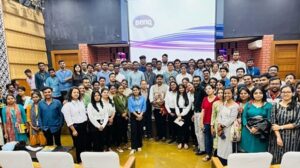 The talk on “Understanding Rights of Children in Indian Context: Policy, Provisions, and Opportunities for Young Professionals,” organized by the KIIT School of Rural Management (KSRM), provided valuable insights into child rights and protection frameworks. Delivered by Mr. Laxminarayan Nanda, Child Protection Specialist at UNICEF, the session underscored the significance of implementing robust child protection policies and the need for skilled professionals in this critical domain.
The talk on “Understanding Rights of Children in Indian Context: Policy, Provisions, and Opportunities for Young Professionals,” organized by the KIIT School of Rural Management (KSRM), provided valuable insights into child rights and protection frameworks. Delivered by Mr. Laxminarayan Nanda, Child Protection Specialist at UNICEF, the session underscored the significance of implementing robust child protection policies and the need for skilled professionals in this critical domain.
Mr. Nanda elaborated on key legislations such as the United Nations Convention on the Rights of the Child (UNCRC), the Juvenile Justice Act (JJA), and the Protection of Children from Sexual Offences Act, 2012 (POSCO). Highlighting successful initiatives like Telangana’s Bharosa Centre model, he illustrated how integrated frameworks can support children’s rights effectively. He also emphasized the need to create opportunities for young professionals to contribute to child protection as development practitioners.
Drawing from over 25 years of experience in the development sector, Mr. Nanda stressed the importance of capacity building and institutional support to advance child welfare. This event highlights the importance of the government’s collaboration with academic institutions and UNICEF to strengthen child protection mechanisms, scale successful models, and encourage professionals to drive impactful change in safeguarding children’s rights in India.
Enhancing Public Policy through Expert Dialogue on Global Health Education
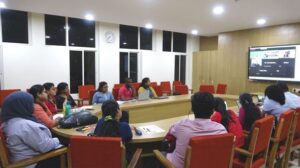 KIIT School of Public Health (KSPH) exemplifies the importance of bridging academia and practical policy-making through its participation in the Consortium of Universities for Global Health’s Academic Partnership Program Initiative (APPI). The International Student Webinar conducted on March 17, 2023, served as a platform for knowledge-sharing and collaboration on curriculum design, experiential learning, and career aspirations within global public health education.
KIIT School of Public Health (KSPH) exemplifies the importance of bridging academia and practical policy-making through its participation in the Consortium of Universities for Global Health’s Academic Partnership Program Initiative (APPI). The International Student Webinar conducted on March 17, 2023, served as a platform for knowledge-sharing and collaboration on curriculum design, experiential learning, and career aspirations within global public health education.
Guided by eminent mentors like Dr. Srikanth Mahankali and moderated by Dr. Pratap Kumar Jena, the event highlighted diverse perspectives from international and domestic students. Discussions emphasized the importance of contextualized education tailored to national and international needs, practical internships, and skill-based learning. These insights align directly with government priorities of fostering employability, promoting experiential learning, and preparing a globally competitive workforce.
The event also reflected on the role of educational institutions in guiding public policy. The panellists’ advocacy for project-based internships and cross-border educational experiences can inform policies promoting academic partnerships, skill development programs, and international collaboration in education. The inclusion of experts like Dr. Mahankali ensures robust guidance for aligning curriculum goals with global industry demands.
Such initiatives underscore how academia can provide expert advice to governments for crafting inclusive and globally relevant public health policies.
https://news.kiit.ac.in/ksph/ksph-conducts-international-student-panel-discussion-on-curriculum/
Strengthening Climate Resilience through Expert Insights for Policy Development
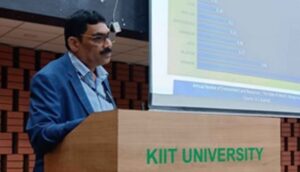 The talk on “Building Climate Resilience of Odisha’s Coastal Communities,” organized by KSRM on March 3, 2023, showcased the critical role of expert dialogue in shaping government strategies for climate adaptation. Delivered by Mr. Dillip Mahapatra, an experienced professional from the United Nations Development Program (UNDP), the talk provided actionable insights into mitigating the impact of climate change on vulnerable coastal communities.
The talk on “Building Climate Resilience of Odisha’s Coastal Communities,” organized by KSRM on March 3, 2023, showcased the critical role of expert dialogue in shaping government strategies for climate adaptation. Delivered by Mr. Dillip Mahapatra, an experienced professional from the United Nations Development Program (UNDP), the talk provided actionable insights into mitigating the impact of climate change on vulnerable coastal communities.
Mr. Mahapatra emphasized the lessons learned from cyclones in Odisha and the need for ecosystem-centered, community-based approaches to build resilience. He discussed the Enhancing Climate Resilience of India’s Coastal Communities (ECRICC) project, which integrates innovative strategies such as mangrove restoration, sea grass protection, and salt marsh preservation to combat climate vulnerabilities. The talk also highlighted the importance of international agreements, policy frameworks, and collaborative approaches to strengthen climate adaptation measures in India.
By drawing from his extensive experience in managing climate-resilient livelihoods and infrastructure through projects supported by the World Bank, GCF, and DFID, Mr. Mahapatra provided valuable recommendations to policymakers. His insights on promoting sustainable rural livelihoods, natural resource management, and value chain development are pivotal in informing government programs aimed at enhancing resilience in coastal regions.
This event reinforces the importance of expert advice in guiding evidence-based climate policies for sustainable development.
Advancing Gender Equality through Technology and Health Initiatives
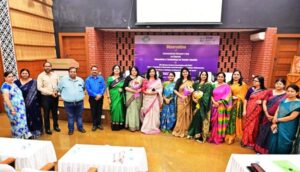 KIIT Deemed to be University’s week-long celebration of International Women’s Day underscores the critical role of institutions in driving gender equality. With the theme “DigitALL: Innovation and Technology for Gender Equality,” the events focused on women’s leadership, cyber security, and health, offering valuable insights for shaping government policies.
KIIT Deemed to be University’s week-long celebration of International Women’s Day underscores the critical role of institutions in driving gender equality. With the theme “DigitALL: Innovation and Technology for Gender Equality,” the events focused on women’s leadership, cyber security, and health, offering valuable insights for shaping government policies.
The discussions emphasized leveraging technology to bridge gender gaps, as highlighted by Prof. Sanghamitra Patnaik, who stressed the importance of women’s participation in the tech industry to ensure diverse and comprehensive solutions for societal challenges. The session on “Women Security @ Cyber Space” shed light on digital safety, with expert advice on protecting sensitive information and promoting secure use of online platforms. Such initiatives could inform government policies on digital literacy and women’s cybersecurity training programs.
Further, the seminar on “Reproductive Health” highlighted the importance of comprehensive health education, safe pregnancies, and prevention of infections. Expert contributions from KIIT’s medical and nursing faculties can guide the government in enhancing public health campaigns, particularly in underserved regions.
KIIT’s initiatives illustrate how academia can collaborate with policymakers to address gender gaps, promote technology-driven empowerment, and improve healthcare access, paving the way for a more inclusive and equitable society.
Harnessing Youth Potential for Global Development and Policy Innovation
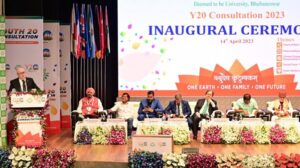 The Y20 Consultations, hosted by KIIT Deemed to be University, highlighted the immense potential of youth in driving sustainable development and fostering global peace. As part of the G20 initiatives, this forum served as a critical platform for young minds from across the globe to engage in deliberations on contemporary global challenges, with the outcomes intended to influence future policymaking.
The Y20 Consultations, hosted by KIIT Deemed to be University, highlighted the immense potential of youth in driving sustainable development and fostering global peace. As part of the G20 initiatives, this forum served as a critical platform for young minds from across the globe to engage in deliberations on contemporary global challenges, with the outcomes intended to influence future policymaking.
Keynote speakers, including Ashwini Kumar Choubey and Tusharkanti Behera, emphasized the transformative role of youth in nation-building, urging them to embrace the principles of cultural unity and innovation. The event showcased themes such as “Vasudhaiva Kutumbakam” (the world is one family), which underscored the importance of preserving cultural heritage while promoting global collaboration.
Discussions on technological innovation, environmental sustainability, and cultural integrity, led by policymakers and global leaders like Virendra Sharma and Robert Pittenger, provide actionable insights for governments. Their emphasis on youth-led initiatives and cross-cultural dialogue demonstrates the importance of incorporating fresh perspectives into policy frameworks.
The forum’s outcomes, set to be presented at the Y20 summit, reflect how youth-driven consultations can inform government strategies on sustainable development, international cooperation, and inclusive growth. Events like Y20 highlight the value of youth in shaping a prosperous, equitable, and peaceful global society.
Promoting Policy Innovation through Academic-Industry Collaboration
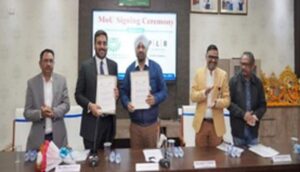 The recent MoU signed between KIIT Deemed to be University and PLR Chambers marks a significant step toward fostering interdisciplinary research and policy innovation. This collaboration, facilitated by the International Centre for Business, Research, and Innovation (ICBRI) under the KIIT School of Social, Financial, and Human Sciences (KSFH), emphasizes the importance of academic-industry partnerships in addressing complex societal challenges.
The recent MoU signed between KIIT Deemed to be University and PLR Chambers marks a significant step toward fostering interdisciplinary research and policy innovation. This collaboration, facilitated by the International Centre for Business, Research, and Innovation (ICBRI) under the KIIT School of Social, Financial, and Human Sciences (KSFH), emphasizes the importance of academic-industry partnerships in addressing complex societal challenges.
By engaging in joint research projects and consulting, this initiative aligns institutional expertise with pressing policy needs. Mr. Aditya Prakash Rao of PLR Chambers highlighted the immense potential of this collaboration in producing actionable insights for governance and reform. Prof. Saranjit Singh, Vice-Chancellor of KIIT DU, underscored the importance of interdisciplinarity, calling for the development of industry-driven knowledge that can inform policy frameworks.
The collaboration will leverage KIIT’s academic strengths and PLR Chambers’ legal and consulting expertise to contribute to evidence-based policymaking. The outcomes, ranging from consulting reports to research-backed recommendations, can significantly benefit government initiatives in areas such as business regulations, financial governance, and legal frameworks.
This partnership exemplifies how academia and industry can work together to generate innovative solutions, providing a model for leveraging expertise to guide government decision-making in achieving sustainable and inclusive growth.
https://news.kiit.ac.in/mou/kiit-du-signs-mou-with-plr-chambers/
Economic Insights to Inform Policy and Everyday Decision-Making
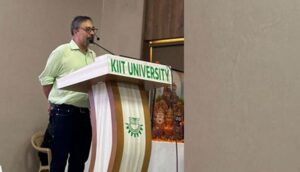 The Special Lecture on ‘Economics in Everyday Life & Policy in India’ organized by KIIT School of Social, Financial, and Human Sciences (KSFH) provided valuable insights into the application of economic principles in daily life and their role in shaping public policy. Delivered by eminent economist Professor Sudipta Sarangi from Virginia Tech University, USA, the lecture simplified complex economic concepts using relatable examples and real-life scenarios.
The Special Lecture on ‘Economics in Everyday Life & Policy in India’ organized by KIIT School of Social, Financial, and Human Sciences (KSFH) provided valuable insights into the application of economic principles in daily life and their role in shaping public policy. Delivered by eminent economist Professor Sudipta Sarangi from Virginia Tech University, USA, the lecture simplified complex economic concepts using relatable examples and real-life scenarios.
Covering diverse topics such as incentives, game theory, price discrimination, and poverty, the session highlighted how economic theories underpin decision-making processes at both individual and societal levels. Professor Sarangi’s engaging explanations demonstrated the relevance of these concepts to key policy domains like poverty alleviation, market regulation, and equitable resource distribution.
The event also fostered dialogue on the importance of integrating academic insights into policymaking. Faculty members, students, and researchers discussed strategies to address economic challenges through informed decision-making. Perspectives shared during the lecture emphasized the need for innovative and evidence-based approaches to tackle persistent issues such as poverty and inequality.
By bridging the gap between theoretical economics and practical application, this lecture supports government efforts to design policies that are both effective and accessible, ensuring sustainable growth and improving the quality of life for all citizens.
